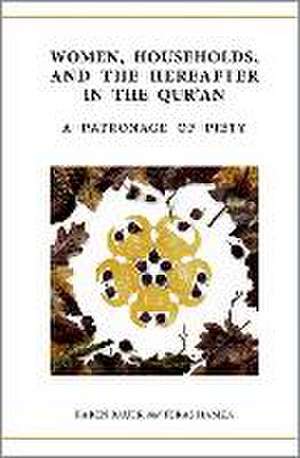Women, Households, and the Hereafter in the Qur'an: A Patronage of Piety: Qur'anic Studies Series
Autor Karen Bauer, Feras Hamzaen Limba Engleză Hardback – 21 dec 2023
Preț: 542.43 lei
Preț vechi: 775.22 lei
-30% Nou
Puncte Express: 814
Preț estimativ în valută:
103.79€ • 108.66$ • 85.88£
103.79€ • 108.66$ • 85.88£
Carte disponibilă
Livrare economică 04-10 martie
Livrare express 04-08 martie pentru 128.28 lei
Preluare comenzi: 021 569.72.76
Specificații
ISBN-13: 9780198897279
ISBN-10: 0198897278
Pagini: 464
Dimensiuni: 145 x 225 x 38 mm
Greutate: 0.66 kg
Editura: OUP OXFORD
Colecția OUP Oxford
Seria Qur'anic Studies Series
Locul publicării:Oxford, United Kingdom
ISBN-10: 0198897278
Pagini: 464
Dimensiuni: 145 x 225 x 38 mm
Greutate: 0.66 kg
Editura: OUP OXFORD
Colecția OUP Oxford
Seria Qur'anic Studies Series
Locul publicării:Oxford, United Kingdom
Recenzii
An essential contribution! Karen Bauer and Feras Hamza's judicious and thorough study engages longstanding and pressing questions about the coexistence in the Qur'an of gender hierarchy with moral-spiritual equality. They show that its treatment of women and households must be understood within its salvific message - and that women and households are key to its vision of individual and communal salvation.
Bauer and Hamza's magisterial study shows how the extensive amount of Qur'anic data on women makes compelling and coherent sense when viewed from an innovative vantage point: the importance of households in the Qur'an's late antique Arabian milieu. Women, Households, and the Hereafter in the Qur'an brims with fresh and exciting insights into how the Qur'an ties together the social and the soteriological and how it negotiates the tension between this-worldly hierarchies and an egalitarian eschatological piety. This monograph constitutes a major advance in the scholarly understanding of the Qur'anic world-view.
A refreshingly original contribution. The authors focus on the Qur'an's deeply egalitarian moral message, a radical idea in the late antique Arabian social setting of households and patronage structures. For the field of gender studies, the authors offer a consistently innovative reading of the Qur'an. The sacred text's treatment of women serves to designate the emerging Muslim community as a moral community: how can women who are vulnerable in a patriarchal patronage society become moral exemplars? The response offered is a profound revision of the traditional scholarly understanding.
Bauer and Hamza's arguments have contributed value to the overall discussion, and with impressive scope. I recommend this book to those interested in women in Islamic history and theology.
Bauer and Hamza's magisterial study shows how the extensive amount of Qur'anic data on women makes compelling and coherent sense when viewed from an innovative vantage point: the importance of households in the Qur'an's late antique Arabian milieu. Women, Households, and the Hereafter in the Qur'an brims with fresh and exciting insights into how the Qur'an ties together the social and the soteriological and how it negotiates the tension between this-worldly hierarchies and an egalitarian eschatological piety. This monograph constitutes a major advance in the scholarly understanding of the Qur'anic world-view.
A refreshingly original contribution. The authors focus on the Qur'an's deeply egalitarian moral message, a radical idea in the late antique Arabian social setting of households and patronage structures. For the field of gender studies, the authors offer a consistently innovative reading of the Qur'an. The sacred text's treatment of women serves to designate the emerging Muslim community as a moral community: how can women who are vulnerable in a patriarchal patronage society become moral exemplars? The response offered is a profound revision of the traditional scholarly understanding.
Bauer and Hamza's arguments have contributed value to the overall discussion, and with impressive scope. I recommend this book to those interested in women in Islamic history and theology.
Notă biografică
Dr Karen Bauer is a Senior Research Associate at the Institute of Ismaili Studies, London. With Feras Hamza she edited An Anthology of Qur'anic Commentaries, Volume II: On Women (OUP, 2021). She is the author of Gender Hierarchy in the Qur'an: Medieval Interpretations, Modern Responses and editor of Aims, Methods and Contexts of Qur'anic Exegesis (2nd/8th-9th/15th Centuries). She has written numerous articles on the history of Qur'anic interpretation, on women's status in Islamic texts and on the history of emotions in Islam. She is the series co-editor for IQSA Studies in the Qur'an.Dr Feras Hamza is Head of the School of the Humanities and Social Sciences at the University of Wollongong in Dubai, UAE, and is also a Senior Research Fellow in the Qur'anic Studies Unit at the Institute of Ismaili Studies, London. He co-edited, with Karen Bauer, An Anthology of Qur'anic Commentaries, Volume II: On Women (OUP, 2021), and with Sajjad Rizvi and Farhana Mayer, An Anthology of Qur'anic Commentaries, Volume I: On the Nature of the Divine (OUP 2008). He is the general series editor for the multi-volume project Anthologies of Qur'anic Commentaries and has authored several historical articles on the early Muslim community, as well as articles on the epistemological and methodological approaches in Qur'anic and tafsīr studies.














